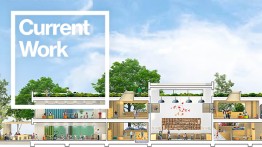Current Work | Accessible Schools
Tuesday, April 23, 2024, 7 - 9pm

This event will be conducted in person only.
This event will bring together architects, educators, and advocates to explore the process of creating learning and teaching environments where the broadest range of bodies and minds can thrive. Focusing on educational facilities for K-12 students, the presentations will examine both the physical design of school buildings and the ways in which educators create spaces of learning for young people.
The program will close with a panel discussion and an audience Q&A moderated by Irina Verona and Jennifer Carpenter.
Panelists
Mary Burnham is a founding partner of MBB Architects, a women-owned practice in New York City. Burnham leads projects in the educational and cultural spheres with a focus on mission driven organizations. She received her MArch from the Yale School of Architecture and a Bachelor of Arts from the University of Pennsylvania. She was elevated to the College of Fellows of the American Institute of Architects in 2018.
Lauren Melissa Ellzey is an autistic self-advocate, author, educator, and activist. Her work highlights, in her own words, “the inequitable systems that oppress queer, BIPOC, and disabled folks.” Ellzey is an instructional support specialist for the Nest Support Project at NYU and has collaborated with organizations such as Reframing Autism. She holds a master’s in library and information science from Syracuse University.
Kayla Hamilton is a performance maker, dancer, educator, and consultant based in the Bronx. She has created access-centered programming for the Mellon Foundation, Movement Research, and DanceNYC, and her work has been presented at venues such as Performance Space NY and New York Live Arts. Hamilton has been a special education teacher at the Highbridge Green School in the Bronx since 2017.
Kristie Patten is counselor to the president at New York University and professor in the department of occupational therapy at the NYU Steinhardt School of Culture, Education, and Human Development. She is the principal investigator of the Nest Support Project at NYU, an inclusive program for children and adolescents with autism in the New York City Department of Education. Patten received her B.S. from Elizabethtown College and a master’s and PhD in Educational Psychology from Temple University.
Irina Verona is a founding principal at Verona Carpenter Architects, an architecture and interior design firm working “at the intersection of physical and social sustainability, designing spaces that give occupants agency and choice,” in the firm’s own words. Verona is a founding editor of Praxis: a Journal of Writing and Building. She received her MArch from Columbia University and a Bachelor of Arts from Princeton University and currently teaches architecture at Barnard College and at Columbia University GSAPP.
Jennifer Carpenter is a founding principal at Verona Carpenter Architects. Carpenter has lectured widely on the subject of designing for neuro inclusion. Carpenter received her MArch from Columbia University and a Bachelor of Arts from Yale University. She currently teaches a course on disability, architecture, and play at Columbia University GSAPP.
Support
This program is supported, in part, by public funds from the New York City Department of Cultural Affairs in partnership with the City Council, and by the New York State Council on the Arts with the support of the Office of the Governor and the New York State Legislature.
The event is co-sponsored by the Architectural League of New York and the Irwin S. Chanin School of Architecture.
Tickets are free for Cooper Union students and faculty with valid ID, and League members. For ticket inquiries, please refer to The Architectural League of New York website.
Located in the Frederick P. Rose Auditorium, at 41 Cooper Square (on Third Avenue between 6th and 7th Streets)




